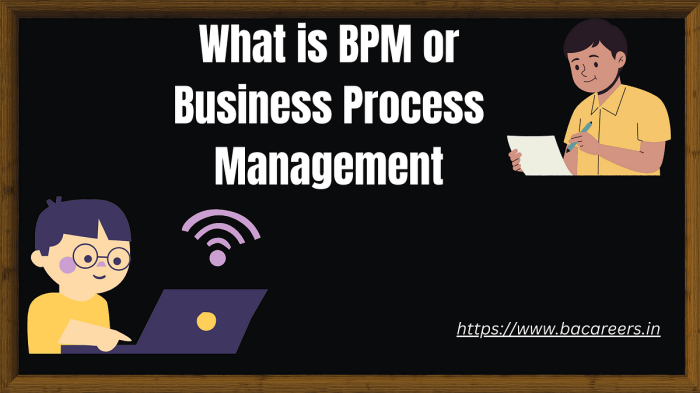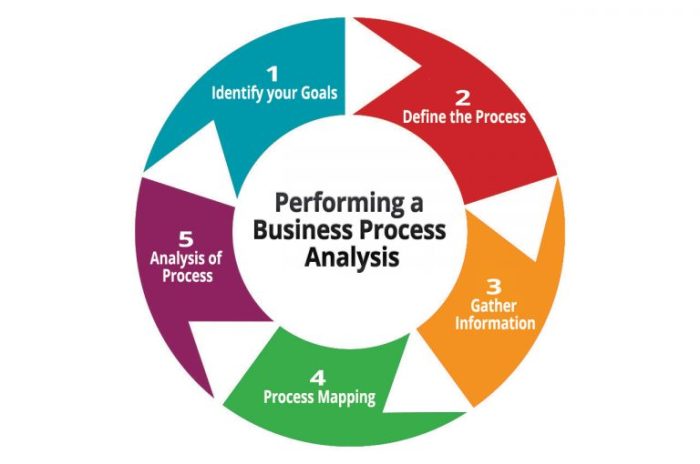Which statement about business process management bpm is false – Which statement about business process management (BPM) is false? This question sets the stage for an in-depth exploration of BPM, its significance, and the misconceptions surrounding it. As we delve into this topic, we will uncover the truth behind various statements and identify the one that stands out as inaccurate, providing a clear understanding of BPM and its role in business operations.
BPM plays a crucial role in enhancing business efficiency, reducing costs, and streamlining operations across various industries. However, it is essential to dispel any false notions or misunderstandings that may hinder its effective implementation. This article aims to shed light on the true nature of BPM, separating fact from fiction.
Business Process Management (BPM) Overview: Which Statement About Business Process Management Bpm Is False

Business Process Management (BPM) is a systematic approach to analyzing, designing, implementing, and monitoring business processes. It focuses on optimizing the flow of information, resources, and activities within an organization to achieve specific business goals. BPM enables businesses to improve efficiency, reduce costs, and enhance customer satisfaction by streamlining operations and eliminating redundancies.
BPM is applicable across various industries, including manufacturing, healthcare, financial services, and retail. For example, in manufacturing, BPM can be used to optimize production processes, reduce lead times, and improve quality control. In healthcare, BPM can be implemented to streamline patient care processes, reduce medical errors, and enhance patient outcomes.
False Statement Identification
False statement:BPM is solely focused on improving customer satisfaction.
Explanation:While improving customer satisfaction is an important goal of BPM, it is not the sole focus. BPM also encompasses optimizing efficiency, reducing costs, and aligning business processes with overall strategic objectives.
BPM Benefits and Challenges
Benefits of BPM
- Improved efficiency and productivity
- Reduced costs and operational expenses
- Enhanced customer satisfaction and loyalty
- Increased agility and responsiveness to changing market demands
- Improved compliance and risk management
Challenges of BPM
- Resistance to change and organizational inertia
- Lack of resources, including financial, technical, and human capital
- Complexity of business processes and integration challenges
- Difficulty in measuring and quantifying BPM benefits
- Cultural and behavioral barriers
BPM Tools and Techniques
BPM Tools Comparison
| Tool | Features |
|---|---|
| IBM Business Process Manager | Process modeling, simulation, execution, and monitoring |
| Oracle BPM Suite | Business process analysis, design, and automation |
| Pegasystems BPM Platform | Low-code development, process automation, and case management |
BPM Techniques
- Process mapping: Visual representation of business processes to identify inefficiencies and improvement opportunities
- Simulation: Modeling and testing of business processes to evaluate different scenarios and optimize performance
- Root cause analysis: Identifying and addressing the underlying causes of process problems
- Lean Six Sigma: A methodology for continuous process improvement and waste reduction
- Activity-based costing: Analyzing the costs associated with different activities within a business process
BPM Best Practices, Which statement about business process management bpm is false
- Involve stakeholders and build consensus
- Use a phased approach to implementation
- Measure and track progress regularly
- Establish a continuous process improvement culture
- Foster collaboration and knowledge sharing
Continuous process improvement is crucial for the success of BPM. By regularly reviewing and updating business processes, organizations can ensure that they remain aligned with changing business needs and technological advancements.
Question Bank
What is the primary goal of BPM?
The primary goal of BPM is to enhance business efficiency, reduce costs, and improve overall performance by optimizing and streamlining business processes.
Is BPM solely focused on automating processes?
No, BPM is not solely focused on automation. While automation can be a valuable aspect, BPM encompasses a broader approach that includes process analysis, optimization, and continuous improvement.
What are the key benefits of implementing BPM?
Implementing BPM can lead to improved efficiency, reduced costs, enhanced customer satisfaction, increased agility, and better decision-making.

